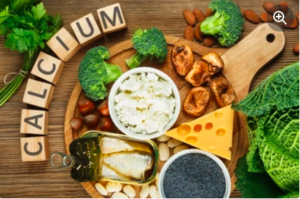Calcium: Not only vital for strong bones and teeth, calcium is also needed for the heart and nervous system and for muscle growth and contraction. Good calcium status prevents acid-alkaline imbalances in the blood. The best sources of usable calcium are dairy products and bone broth (although the amounts are much smaller in bone broth). In cultures where dairy products are not used, bone broth is essential. Calcium in meats, vegetables and grains is difficult to absorb. Both iron and zinc can inhibit calcium absorption as can excess phosphorus and magnesium. Phytic acid in the bran of grains that have not been soaked, fermented, sprouted or naturally leavened will bind with calcium and other minerals in the intestinal tract, making these minerals less available. Sufficient vitamin D is needed for calcium absorption as is a proper potassium/calcium ratio in the blood. Sugar consumption and stress both pull calcium from the bones.
No use taking calcium without magnesium to help it absorb.
Calcium is essential for healthy bones and teeth, and the proper functioning of the heart.
Calcium works with magnesium in its functions in the blood, nerves, muscles, and tissues.
- Dairy is not a good bioavailable source of calcium as more than calcium is needed.
- Modern medicine’s reliance on retail drugs misses this.
Micro-minerals and Vit D are needed for much calcium (and phosphorus) to be absorbed from the digestive tract. is it even appropriate for you to take a calcium tablet at all?
- Eat a traditional varied diet and have a healthy gut.
- Fermented foods, bone broths may give you far more scope for a healthy life.
(Indeed – why not eat sardines and eat the bones).
A low level of calcium supposedly has been associated with osteoporosis, which weakens the bones of our body and can lead to fractures. What about magnesium? What about looking at the pH of the blood? What about looking at the whole body? What about making sure the Vit D levels are at the upper limit? Sunlight? Great idea.
Our bones increase in strength and density from childhood until our mid-20s. Bone mass increases by about sevenfold from birth to puberty, threefold during adolescence, and then remains stable until about age 50 in men and until the menopause in women.
Osteoporosis is the name given to the process of thinning of bone tissue and loss of bone density over time. Calcium and phosphate are often identified as the principal minerals essential for normal bone formation.
What is not said is that calcium levels are determined by the balance of calcium and magnesium in our bodies. This is the crucial point that is often missed.
How much calcium do we need?
Most advice about calcium intake ignores other essential elements that are needed to ensure the optimum rate of bone density and bodily health. Should we be taking calcium supplements? Are they even safe?
Calicifying yourself? Magnesium on the skin is best . .
Make sure there is enough magnesium and Vit K . . and Vit D . .
Were to get calcium that is available? Raw fermented dairy, kale, sesame seeds – especially tahini. You do need to have good stomach acid and the fermented dairy would be excellent here.
Watch here for more information:
Is your calcium supplement killing you?
Why you need bio available minerals . .
Why are minerals so important?




